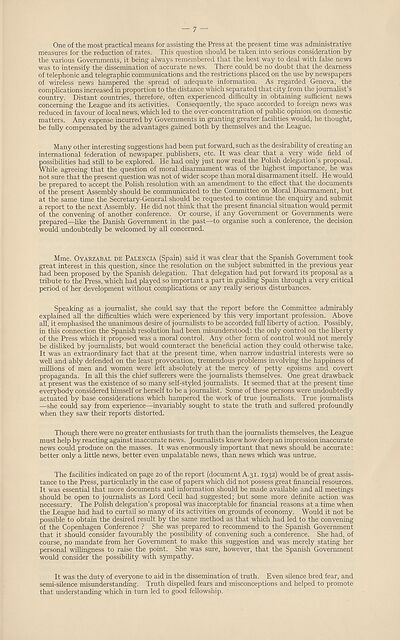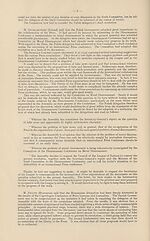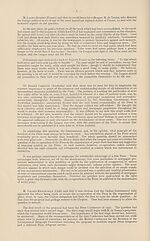Download files
Complete book:
Individual page:
Thumbnail gallery: Grid view | List view

— 7 —
One of the most practical means for assisting the Press at the present time was administrative
measures for the reduction of rates. This question should be taken into serious consideration by
the various Governments, it being always remembered that the best way to deal with false news
was to intensify the dissemination of accurate news. There could be no doubt that the dearness
of telephonic and telegraphic communications and the restrictions placed on the use by newspapers
of wireless news hampered the spread of adequate information. As regarded Geneva, the
complications increased in proportion to the distance which separated that city from the journalist's
country. Distant countries, therefore, often experienced difficulty in obtaining sufficient news
concerning the League and its activities. Consequently, the space accorded to foreign news was
reduced in favour of local news, which led to the over-concentration of public opinion on domestic
matters. Any expense incurred by Governments in granting greater facilities would, he thought,
be fully compensated by the advantages gained both by themselves and the League.
Many other interesting suggestions had been put forward, such as the desirability of creating an
international federation of newspaper publishers, etc. It was clear that a very wide field of
possibilities had still to be explored. He had only just now read the Polish delegation’s proposal.
While agreeing that the question of moral disarmament was of the highest importance, he was
not sure that the present question was not of wider scope than moral disarmament itself. He would
be prepared to accept the Polish resolution with an amendment to the effect that the documents
of the present Assembly should be communicated to the Committee on Moral Disarmament, but
at the same time the Secretary-General should be requested to continue the enquiry and submit
a report to the next Assembly. He did not think that the present financial situation would permit
of the convening of another conference. Or course, if any Government or Governments were
prepared—like the Danish Government in the past—to organise such a conference, the decision
would undoubtedly be welcomed by all concerned.
Mme. Oyarzabal de Palencia (Spain) said it was clear that the Spanish Government took
great interest in this question, since the resolution on the subject submitted in the previous year
had been proposed by the Spanish delegation. That delegation had put forward its proposal as a
tribute to the Press, which had played so important a part in guiding Spain through a very critical
period of her development without complications or any really serious disturbances.
Speaking as a journalist, she could say that the report before the Committee admirably
explained all the difficulties which were experienced by this very important profession. Above
all, it emphasised the unanimous desire of journalists to be accorded full liberty of action. Possibly,
in this connection the Spanish resolution had been misunderstood: the only control on the liberty
of the Press which it proposed was a moral control. Any other form of control would not merely
be disliked by journalists, but would counteract the beneficial action they could otherwise take.
It was an extraordinary fact that at the present time, when narrow industrial interests were so
well and ably defended on the least provocation, tremendous problems involving the happiness of
millions of men and women were left absolutely at the mercy of petty egoisms and covert
propaganda. In all this the chief sufferers were the journalists themselves. One great drawback
at present was the existence of so many self-styled journalists. It seemed that at the present time
everybody considered himself or herself to be a journalist. Some of these persons were undoubtedly
actuated by base considerations which hampered the work of true journalists. True journalists
—she could say from experience—invariably sought to state the truth and suffered profoundly
when they saw their reports distorted.
Though there were no greater enthusiasts for truth than the journalists themselves, the League
must help by reacting against inaccurate news. Journalists knew how deep an impression inaccurate
news could produce on the masses. It was enormously important that news should be accurate:
better only a little news, better even unpalatable news, than news which was untrue.
The facilities indicated on page 20 of the report (document A.31.1932) would be of great assis¬
tance to the Press, particularly in the case of papers which did not possess great financial resources.
It was essential that more documents and information should be made available and all meetings
should be open to journalists as Lord Cecil had suggested; but some more definite action was
necessary. The Polish delegation’s proposal was inacceptable for financial reasons at a time when
the League had had to curtail so many of its activities on grounds of economy. Would it not be
possible to obtain the desired result by the same method as that which had led to the convening
of the Copenhagen Conference ? She was prepared to recommend to the Spanish Government
that it should consider favourably the possibility of convening such a conference. She had, of
course, no mandate from her Government to make this suggestion and was merely stating her
personal willingness to raise the point. She was sure, however, that the Spanish Government
would consider the possibility with sympathy.
It was the duty of everyone to aid in the dissemination of truth. Even silence bred fear, and
semi-silence misunderstanding. Truth dispelled fears and misconceptions and helped to promote
that understanding which in turn led to good fellowship.
One of the most practical means for assisting the Press at the present time was administrative
measures for the reduction of rates. This question should be taken into serious consideration by
the various Governments, it being always remembered that the best way to deal with false news
was to intensify the dissemination of accurate news. There could be no doubt that the dearness
of telephonic and telegraphic communications and the restrictions placed on the use by newspapers
of wireless news hampered the spread of adequate information. As regarded Geneva, the
complications increased in proportion to the distance which separated that city from the journalist's
country. Distant countries, therefore, often experienced difficulty in obtaining sufficient news
concerning the League and its activities. Consequently, the space accorded to foreign news was
reduced in favour of local news, which led to the over-concentration of public opinion on domestic
matters. Any expense incurred by Governments in granting greater facilities would, he thought,
be fully compensated by the advantages gained both by themselves and the League.
Many other interesting suggestions had been put forward, such as the desirability of creating an
international federation of newspaper publishers, etc. It was clear that a very wide field of
possibilities had still to be explored. He had only just now read the Polish delegation’s proposal.
While agreeing that the question of moral disarmament was of the highest importance, he was
not sure that the present question was not of wider scope than moral disarmament itself. He would
be prepared to accept the Polish resolution with an amendment to the effect that the documents
of the present Assembly should be communicated to the Committee on Moral Disarmament, but
at the same time the Secretary-General should be requested to continue the enquiry and submit
a report to the next Assembly. He did not think that the present financial situation would permit
of the convening of another conference. Or course, if any Government or Governments were
prepared—like the Danish Government in the past—to organise such a conference, the decision
would undoubtedly be welcomed by all concerned.
Mme. Oyarzabal de Palencia (Spain) said it was clear that the Spanish Government took
great interest in this question, since the resolution on the subject submitted in the previous year
had been proposed by the Spanish delegation. That delegation had put forward its proposal as a
tribute to the Press, which had played so important a part in guiding Spain through a very critical
period of her development without complications or any really serious disturbances.
Speaking as a journalist, she could say that the report before the Committee admirably
explained all the difficulties which were experienced by this very important profession. Above
all, it emphasised the unanimous desire of journalists to be accorded full liberty of action. Possibly,
in this connection the Spanish resolution had been misunderstood: the only control on the liberty
of the Press which it proposed was a moral control. Any other form of control would not merely
be disliked by journalists, but would counteract the beneficial action they could otherwise take.
It was an extraordinary fact that at the present time, when narrow industrial interests were so
well and ably defended on the least provocation, tremendous problems involving the happiness of
millions of men and women were left absolutely at the mercy of petty egoisms and covert
propaganda. In all this the chief sufferers were the journalists themselves. One great drawback
at present was the existence of so many self-styled journalists. It seemed that at the present time
everybody considered himself or herself to be a journalist. Some of these persons were undoubtedly
actuated by base considerations which hampered the work of true journalists. True journalists
—she could say from experience—invariably sought to state the truth and suffered profoundly
when they saw their reports distorted.
Though there were no greater enthusiasts for truth than the journalists themselves, the League
must help by reacting against inaccurate news. Journalists knew how deep an impression inaccurate
news could produce on the masses. It was enormously important that news should be accurate:
better only a little news, better even unpalatable news, than news which was untrue.
The facilities indicated on page 20 of the report (document A.31.1932) would be of great assis¬
tance to the Press, particularly in the case of papers which did not possess great financial resources.
It was essential that more documents and information should be made available and all meetings
should be open to journalists as Lord Cecil had suggested; but some more definite action was
necessary. The Polish delegation’s proposal was inacceptable for financial reasons at a time when
the League had had to curtail so many of its activities on grounds of economy. Would it not be
possible to obtain the desired result by the same method as that which had led to the convening
of the Copenhagen Conference ? She was prepared to recommend to the Spanish Government
that it should consider favourably the possibility of convening such a conference. She had, of
course, no mandate from her Government to make this suggestion and was merely stating her
personal willingness to raise the point. She was sure, however, that the Spanish Government
would consider the possibility with sympathy.
It was the duty of everyone to aid in the dissemination of truth. Even silence bred fear, and
semi-silence misunderstanding. Truth dispelled fears and misconceptions and helped to promote
that understanding which in turn led to good fellowship.
Set display mode to:
![]() Universal Viewer |
Universal Viewer | ![]() Mirador |
Large image | Transcription
Mirador |
Large image | Transcription
Images and transcriptions on this page, including medium image downloads, may be used under the Creative Commons Attribution 4.0 International Licence unless otherwise stated. ![]()
| League of Nations > Armament > Co-operation of the press in the organisation of peace > (7) |
|---|
| Permanent URL | https://digital.nls.uk/195356322 |
|---|
| Shelfmark | LN.IX |
|---|
| Description | Over 1,200 documents from the non-political organs of the League of Nations that dealt with health, disarmament, economic and financial matters for the duration of the League (1919-1945). Also online are statistical bulletins, essential facts, and an overview of the League by the first Secretary General, Sir Eric Drummond. These items are part of the Official Publications collection at the National Library of Scotland. |
|---|---|
| Additional NLS resources: |
|

